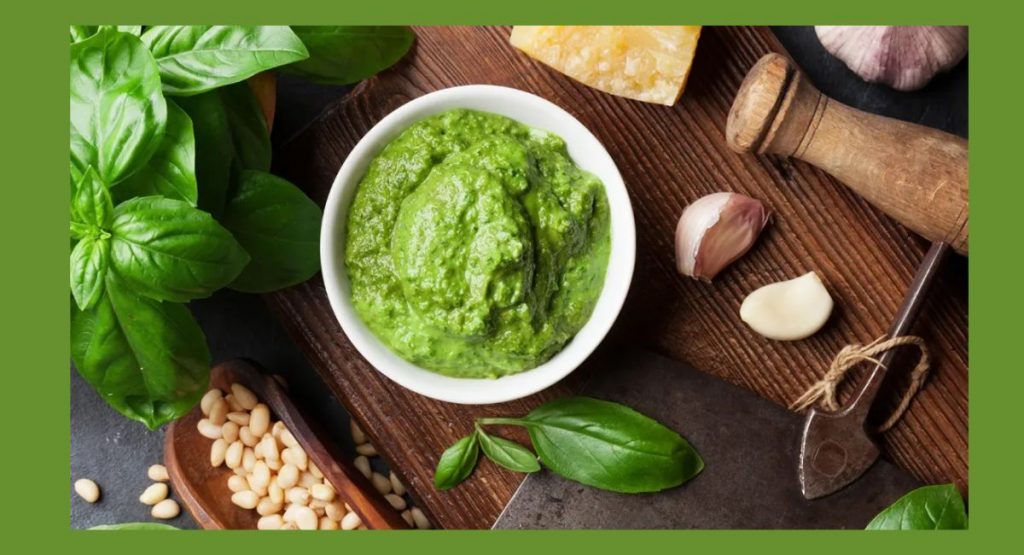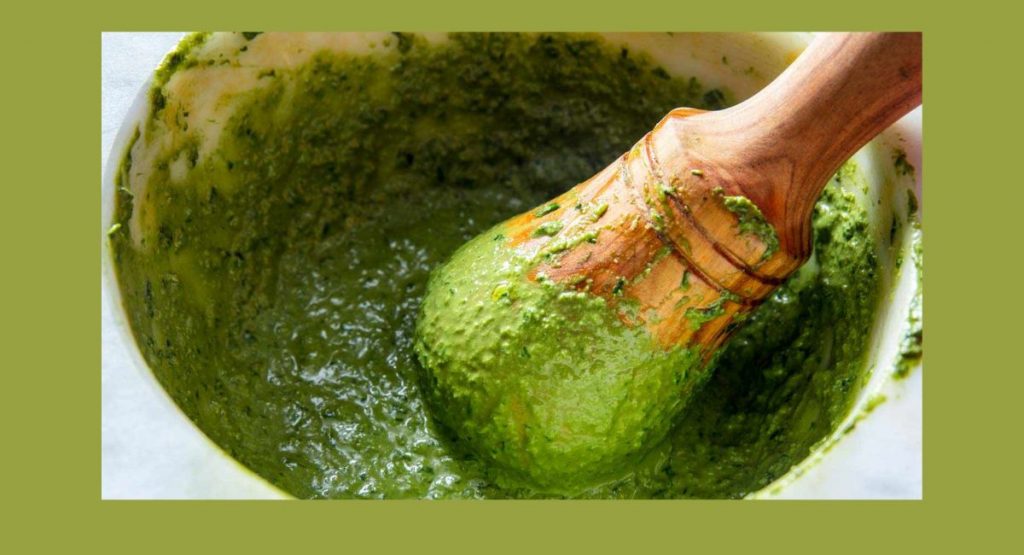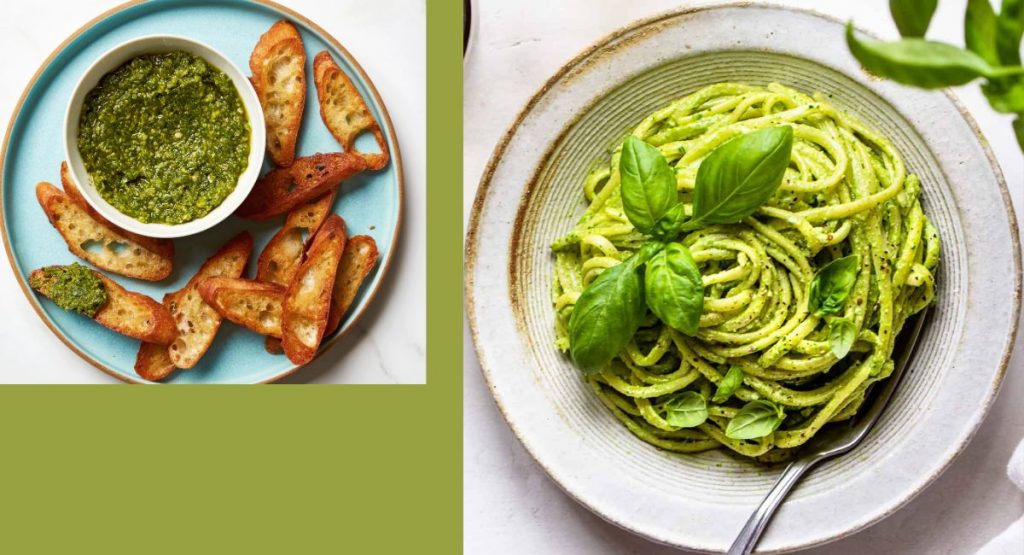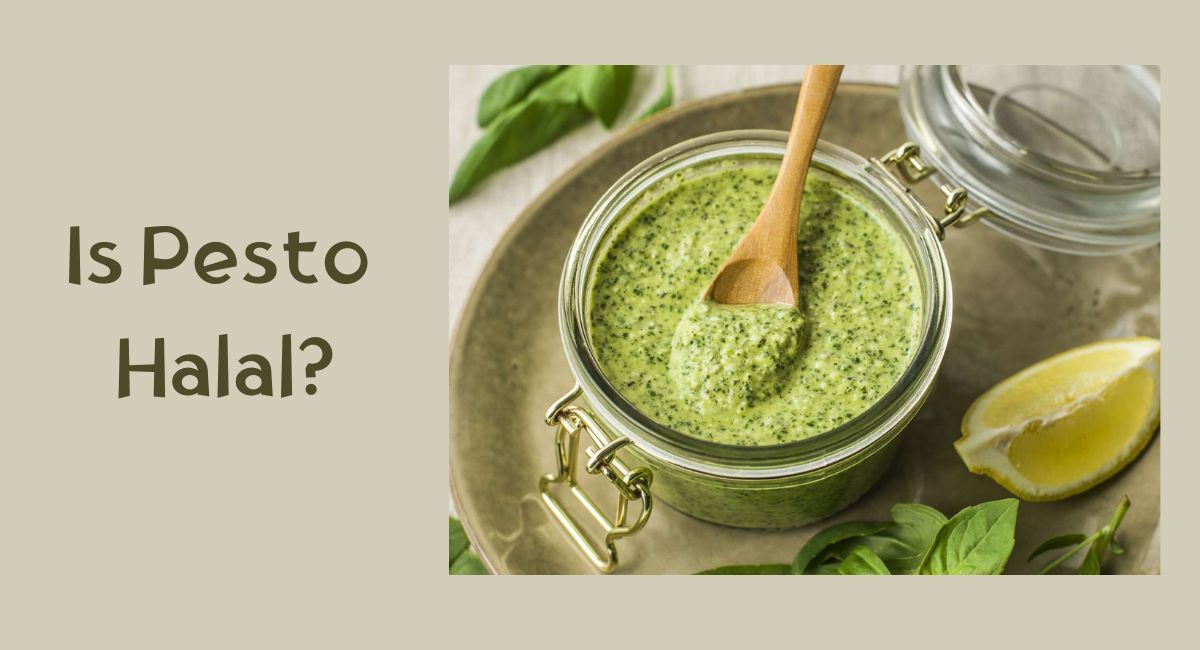Pesto is a versatile sauce commonly used in Italian cuisine. It’s made with a blend of crushed garlic, basil, pine nuts, parmesan cheese and olive oil – delicious ingredients that make it perfect for pasta dishes. But, the question remains: is pesto halal? This blog post will explore this topic to help you make an informed decision. We’ll look at the ingredients that make up pesto, as well as other factors like production methods and religious guidelines to determine if this popular condiment is suitable for people of the Islamic faith. Hopefully, by the end, you’ll be able to answer with confidence whether or not pesto is halal.
What is Pesto?

Pesto is a type of Italian sauce that originated in Genoa, Italy. It typically consists of garlic, pine nuts, basil leaves, Parmigiano-Reggiano (or Pecorino Sardo) cheese, and extra-virgin olive oil. The ingredients are blended together to form a thick paste or sauce with a strong flavour. It can be used as an accompaniment to various dishes, such as pasta and fish, or as a spread on sandwiches or toast.
It is a versatile condiment that can add flavour and zest to any dish. Pesto is also very simple to make at home with readily available ingredients- all you need are herbs, nuts, cheese, and oil. With a few simple steps and some ingredients, you can have a delicious homemade pesto in no time at all.
Whether it’s served with pasta or used as a topping on pizza, pesto is sure to be a crowd-pleaser. Pesto can also make for an easy and flavorful appetizer or dip when spread onto crostini and served with vegetables. Pesto can be stored in the refrigerator for up to a week or frozen for up to 3 months, making it perfect for meal prep and busy family dinners. No matter how you choose to enjoy it, pesto is sure to be a hit!
For a traditional Italian version of pesto, try using Genovese basil leaves as the main ingredient. This variety of basil has a sweeter and more delicate flavour that pairs perfectly with the other ingredients in pesto. Another option is to use fresh spinach or arugula instead of basil for a more earthy flavour.
If you’re feeling adventurous, you can also experiment with different nuts and cheeses to create your own unique pesto. No matter how you make it, your homemade pesto is sure to be delicious! So go ahead and give it a try! Pesto is the perfect way to add flavour and zest to any dish. With its simple ingredients and easy-to-follow steps, it’s no wonder pesto is a crowd favourite.
Pesto Ingredients

Pesto is a delicious Italian sauce made with fresh ingredients and is most commonly used as an accompaniment to pasta. Here is a list of ingredients you need to make your own pesto:
- Extra virgin olive oil
- Fresh basil leaves
- Parmesan cheese, freshly grated
- Garlic cloves, minced
- Pine nuts
- Salt and freshly ground black pepper to taste
- Optional: lemon juice for extra zing.
To make the pesto sauce, add all ingredients into a blender or food processor and blend until a paste is formed. Enjoy your delicious pesto over pasta or use it as a topping for crostini or bruschetta.
Adding a little bit of lemon juice can give your pesto an extra zesty kick, so feel free to add it in if you’d like! Have fun experimenting with different combinations of ingredients and ratios until you create the perfect homemade pesto sauce. Bon appetite!
Is Pesto Vegetarian?
Pesto is a delicious Italian sauce, traditionally made with crushed garlic, basil, pine nuts, Parmigiano-Reggiano or Pecorino cheese and olive oil. The name pesto is derived from the Italian verb pestare which means to pound or crush. While this classic version of pesto is vegetarian-friendly, some varieties of pesto may contain other ingredients such as meat or fish.
Generally, vegetarian-friendly pesto does not include any animal products and can be found in grocery stores or made at home with a few simple ingredients. To ensure that the pesto you are consuming is vegetarian, check the ingredients list for any animal products such as anchovies, pancetta or lard. Additionally, some store-bought pesto varieties may also include parmesan cheese which is not vegetarian-friendly.
When making pesto at home, you can easily make it vegetarian-friendly by substituting the Parmigiano Reggiano or Pecorino cheese for a vegan variety such as nutritional yeast or vegan Parmesan. Additionally, you can also use other types of nuts such as walnuts, almonds, cashews or macadamias in place of pine nuts. Lastly, adding vegetables such as spinach, kale or broccoli is a great way to add more nutrition and flavour to your pesto sauce.
In conclusion, the classic version of pesto is vegetarian-friendly but it is important to check the ingredients list for any animal products when consuming store-bought varieties. Making your own pesto at home can also be a great way to ensure that it is completely vegetarian-friendly and delicious!
Is Pesto Vegan?
Yes — pesto can be vegan. It depends on the ingredients that are used to make it. Traditional pesto recipes contain parmesan cheese, which means it’s not vegan. However, if you substitute the parmesan cheese with a plant-based alternative such as nutritional yeast or vegan cheese, then you can make a completely vegan pesto. You can also use nutrient-rich ingredients such as walnuts, almonds, and sun-dried tomatoes to add flavour and texture.
When making vegan pesto, it’s important to use extra virgin olive oil for the best flavour. While some recipes call for other oils, these may not have the same depth of flavour as extra virgin olive oil. Additionally, make sure that you use fresh basil leaves for the most vibrant pesto.
When making a vegan pesto, it’s important to select ingredients that are of good quality and organic when possible. Whole food plant-based ingredients will provide much more nutrition than processed alternatives. If you’re looking for a vegan pesto recipe, there are plenty to choose from online that are both delicious and nutritious.
Vegan pesto is a great way to enjoy the flavour of traditional pesto without any animal products. With just a few simple tweaks, it can be made completely vegan while still being filled with flavour and nutrition. So don’t be afraid to experiment and get creative with your vegan pesto! Bon appetite!
Is Pesto Halal Or Haram?

No, pesto is not considered halal. Pesto is a sauce made from olive oil, pine nuts, garlic, Parmesan cheese, and basil. Generally speaking, the ingredients in pesto are regarded as permissible for people of all faiths to eat. However, individual interpretations may vary depending on one’s religious beliefs and dietary restrictions.
It is important to note that Parmesan cheese, which is a key ingredient in pesto, is not considered halal by some authorities. The traditional production method for this type of cheese involves the use of animal rennet as a coagulant agent. Animal rennet is derived from the stomachs of slaughtered animals and can be seen as haram (forbidden) by some religious authorities.
Therefore, it is important to check the label when purchasing pesto to ensure it does not contain animal rennet or any other haram ingredients. In some instances, vegetarian-friendly versions of Parmesan cheese may be available which do not involve the use of animal derivatives. As an alternative to Parmesan cheese, some halal-friendly recipes may suggest the use of nutritional yeast or vegan cheese as an ingredient in pesto.
In addition to the ingredients used in pesto, it is also important to consider any other additional processing steps that may be involved. For example, if the product has been processed on non-halal equipment or with non-halal additives, it may no longer be permissible for consumption.
For those who adhere to strict dietary restrictions, seeking out commercially prepared halal pesto products or preparing homemade recipes with certified halal ingredients is the safest option. Alternatively, individuals may choose to abstain from pesto altogether if they deem that it does not meet their religious standards. Ultimately, it is up to each individual to decide what is halal or haram for them according to their own beliefs and dietary restrictions.
In conclusion, while pesto ingredients are permissible for people of all faiths, the use of animal rennet in Parmesan cheese can make it haram for some individuals. Therefore, it is important to check the label of store-bought products and make sure any homemade recipes use only certified halal ingredients. Ultimately, it is up to each person to decide if pesto meets their own religious standards.
Conclusion
In conclusion, pesto is generally considered to be Halal as long as it does not contain any ingredients that are forbidden according to Islamic dietary laws. It is important for Muslims to pay attention to the ingredients used when purchasing prepared pesto sauces and to make sure they check with a trusted source if there are any questions or concerns.
While some ingredients, such as cheese, may not be considered Halal, alternative vegan options are available for Muslims looking to enjoy the flavours of pesto without compromising their dietary restrictions. Ultimately, it is important for Muslims to make sure that they understand the ingredients used in any food they consume and ensure that it is permissible according to Islamic teachings.
Gain a thorough understanding of the halal compatibility of various Italian sauces by exploring our detailed guides. Make well-informed choices for your culinary preferences and dietary requirements.
Is Alfredo Sauce Halal: Uncover the halal status of Alfredo sauce by exploring our detailed article. Learn about its components and the considerations that can help you determine if it aligns with your dietary preferences.
Is Arrabbiata Sauce Halal: Dive into the world of halal cuisine with our article on Arrabbiata sauce. Explore the ingredients and factors that influence its halal certification to make confident choices in your culinary journey.
Is Marinara Sauce Halal: Find out if Marinara sauce meets halal standards by reading our comprehensive article. Delve into the ingredients and explore the nuances of its preparation to ensure it fits within your halal diet.






